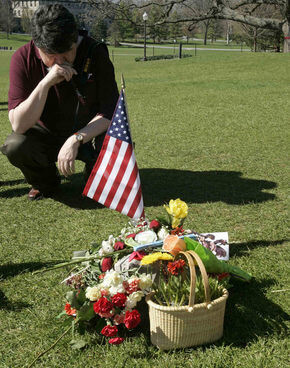hankyoreh
Links to other country sites 다른 나라 사이트 링크
[Analysis] Looking at America’s response to tragedy

U.S. society showed a marked difference from that of South Korea in trying to heal the emotional gulf left after a tragedy. In the aftermath of the Virginia Tech University massacre, the worst shooting rampage in U.S. history, there were no gatherings to express resentment toward Koreans and no bereaved families crying out loudly, "Bring my child back to life." It was impressive to see people mourn quietly and recall favorable memories about the deceased.
It was nearly impossible to hear about a student, faculty member, alumni, or area resident deriding Seung-hui Cho, who murdered 32 innocent people. There was no joint funeral held nor press conference requested by the victims’ families to wage a protest about the tragedy. Mourning ceremonies were held quietly, scattered throughout the world. Funerals were calmly, sorrowfully attended by victims’ friends and families.
As time went by, the Americans have been getting to understand pains of Cho, who was a “mental patient,’’ and forgive him. There is a memorial stone for Cho, with handwritten notes saying things such as, "I feel bad that you did not get help that you so desperately needed."
People are praying for reconciliation and forgiveness. Charles Steger, president of Virginia Tech, stressed the necessity to place the focus on healing the wounds of the bereaved families and the community.
Dr. Stephen Linton, president of the Eugene Bell Foundation, who knows well both South Korean and American cultures, pointed out the different views of the two nations about the shooting spree. According to Linton, Koreans tend to judge the tragedy from an ethnic point of view and react as a group, while Americans do so from a completely individualistic point of view. Regarding the Americans’ calm, non-racialized response to the massacre, Linton explained that since World War II, Americans have identified nationalism with Nazism, and that middle and high school students in the United States are educated to understand the anger and frustration felt by ethnic minority groups. He also said that the Christian atmosphere of the so-called "Bible Belt" spanning across the southern U.S., including Virginia, has played a role in the promotion of forgiveness and reconciliation in the wake of the tragedy.
But Matthew Glick, a producer of NBC’s Today Show, warned that some young students or those who have not received proper education on such matters might respond violently to the shootings. Nevertheless, he, too, stressed that the U.S. mainstream society is reacting calmly and reasonably about the tragedy.
Virginia Tech, which has been placed in a worldwide media spotlight, has reportedly started to heal its emotional wounds. There was a campus-wide silent prayer for the victims on April 23, at 9:45 am, just when the killings began a week earlier. The campus bell tolled 32 times, and the same number of white balloons were released into the sky. Although classes have resumed, no one is unaware of the fact that it will take a long time to heal so many broken hearts.
Please direct questions or comments to [englishhani@hani.co.kr]
Editorial・opinion
![[Editorial] Does Yoon think the Korean public is wrong? [Editorial] Does Yoon think the Korean public is wrong?](https://flexible.img.hani.co.kr/flexible/normal/500/300/imgdb/original/2024/0417/8517133419684774.jpg) [Editorial] Does Yoon think the Korean public is wrong?
[Editorial] Does Yoon think the Korean public is wrong?![[Editorial] As it bolsters its alliance with US, Japan must be accountable for past [Editorial] As it bolsters its alliance with US, Japan must be accountable for past](https://flexible.img.hani.co.kr/flexible/normal/500/300/imgdb/original/2024/0417/6817133413968321.jpg) [Editorial] As it bolsters its alliance with US, Japan must be accountable for past
[Editorial] As it bolsters its alliance with US, Japan must be accountable for past- [Guest essay] Amending the Constitution is Yoon’s key to leaving office in public’s good graces
- [Editorial] 10 years on, lessons of Sewol tragedy must never be forgotten
- [Column] A death blow to Korea’s prosecutor politics
- [Correspondent’s column] The US and the end of Japanese pacifism
- [Guest essay] How Korea turned its trainee doctors into monsters
- [Guest essay] As someone who helped forge Seoul-Moscow ties, their status today troubles me
- [Editorial] Koreans sent a loud and clear message to Yoon
- [Column] In Korea’s midterm elections, it’s time for accountability
Most viewed articles
- 1‘Right direction’: After judgment day from voters, Yoon shrugs off calls for change
- 2[Editorial] Does Yoon think the Korean public is wrong?
- 3Strong dollar isn’t all that’s pushing won exchange rate into to 1,400 range
- 4Where Sewol sank 10 years ago, a sea of tears as parents mourn lost children
- 5Japan officially says compensation of Korean forced laborers isn’t its responsibility
- 6[Editorial] As it bolsters its alliance with US, Japan must be accountable for past
- 7[News analysis] Watershed augmentation of US-Japan alliance to put Korea’s diplomacy to the test
- 8Korea ranks among 10 countries going backward on coal power, report shows
- 9Faith in the power of memory: Why these teens carry yellow ribbons for Sewol
- 10[Guest essay] Amending the Constitution is Yoon’s key to leaving office in public’s good graces